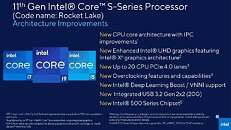Monday, December 28th 2020

Intel Core i7-11700K "Rocket Lake" CPU Outperforms AMD Ryzen 9 5950X in Single-Core Tests
Intel's Rocket Lake-S platform is scheduled to arrive at the beginning of the following year, which is just a few days away. The Rocket Lake lineup of processors is going to be Intel's 11th generation of Core desktop CPUs and the platform is expected to make a debut with Intel's newest Cypress Cove core design. Thanks to the Geekbench 5 submission, we have the latest information about the performance of the upcoming Intel Core i7-11700K 8C/16T processor. Based on the Cypress Cove core, the CPU is allegedly bringing a double-digit IPC increase, according to Intel.
In the single-core result, the CPU has managed to score 1807 points, while the multi-core score is 10673 points. The CPU ran at the base clock of 3.6 GHz, while the boost frequency is fixed at 5.0 GHz. Compared to the previous, 10th generation, Intel Core i7-10700K which scores 1349 single-core score and 8973 points multi-core score, the Rocket Lake CPU has managed to put out 34% higher single-core and 19% higher multi-core score. When it comes to the comparison to AMD offerings, the highest-end Ryzen 9 5950X is about 7.5% slower in single-core result, and of course much faster in multi-core result thanks to double the number of cores.
Sources:
Leakbench, via VideoCardz
In the single-core result, the CPU has managed to score 1807 points, while the multi-core score is 10673 points. The CPU ran at the base clock of 3.6 GHz, while the boost frequency is fixed at 5.0 GHz. Compared to the previous, 10th generation, Intel Core i7-10700K which scores 1349 single-core score and 8973 points multi-core score, the Rocket Lake CPU has managed to put out 34% higher single-core and 19% higher multi-core score. When it comes to the comparison to AMD offerings, the highest-end Ryzen 9 5950X is about 7.5% slower in single-core result, and of course much faster in multi-core result thanks to double the number of cores.


114 Comments on Intel Core i7-11700K "Rocket Lake" CPU Outperforms AMD Ryzen 9 5950X in Single-Core Tests
Is this AVX512 or what
Rocket Lake has bigger L1 cache... and also bigger L2 cache. It might also be a wider core, does anyone have the information on the backend of Cyprus Cove?
But it was never a real lead since the Ryzen 5000 launch was a paper launch.
I recently built 10850k, no OC just power limits removed, 320W+. I would have put just as beefy cooling on a Ryzen CPU if I wanted to get the best out of it. And that would be pulling well over 125W rated TDP.
P.s. The owner also didn't care about his electric bill. surprise! surprise!
That one sub-test on its own lifts the single-core score by 10 percentage points, so the final score is fairly misleading. Rocket Lake is an improvement, but not a 30% improvement.
If they can make a CPU 20% faster that's great, but if they have to run it with a chiller to do it.....
"The gaming crown" probably also goes with it, when lucky owners can play at 150-200+ FPS at... mighty FHD... Can it run Crysis? Old one?
It never happened, because Intel thought 10 nm was worth waiting for.. :slap:
Also, I don't trust g**kbench either.
Only one (questionable) benchmark score, but I'd take a 34% single thread and 19% multi thread improvement for the same price, or even lower if some rumors are correct.
Obviously if your workload needs more than 8c/16t, Ryzen's still your uncle.
There will probably be many Sandy Bridge and Haswell owners looking for a good upgrade.While the rated clock speeds are a bit optimistic, their TDPs are accurate for sustained power consumption at stock.
@freeagent
It will be(a good year for CPU sales), but they Both could do much better if they had enough manufacturing capacity in the right places and at the right time, like now for example, hence I'm expecting these to be like unicorn tears on release and for they're life.
Should probably upgrade my fuse box for that..
Ultimately, that's why it is important to understand these benchmarks. Everyone has an opinion on what is, or isn't, a "standard computer workload" these days. Knowing whether to emphasize something like AES-performance or Deep-learning instructions, or 512-bit vectors... or 128kB L1 cache (M1) or 512kB L2 cache (AMD Zen3 / Intel Cyprus Cove)... like we all can invent a benchmark to make our favorite CPU win every time. The question is what is the "standard" workload that we all agree is representative of reality?